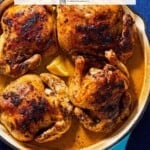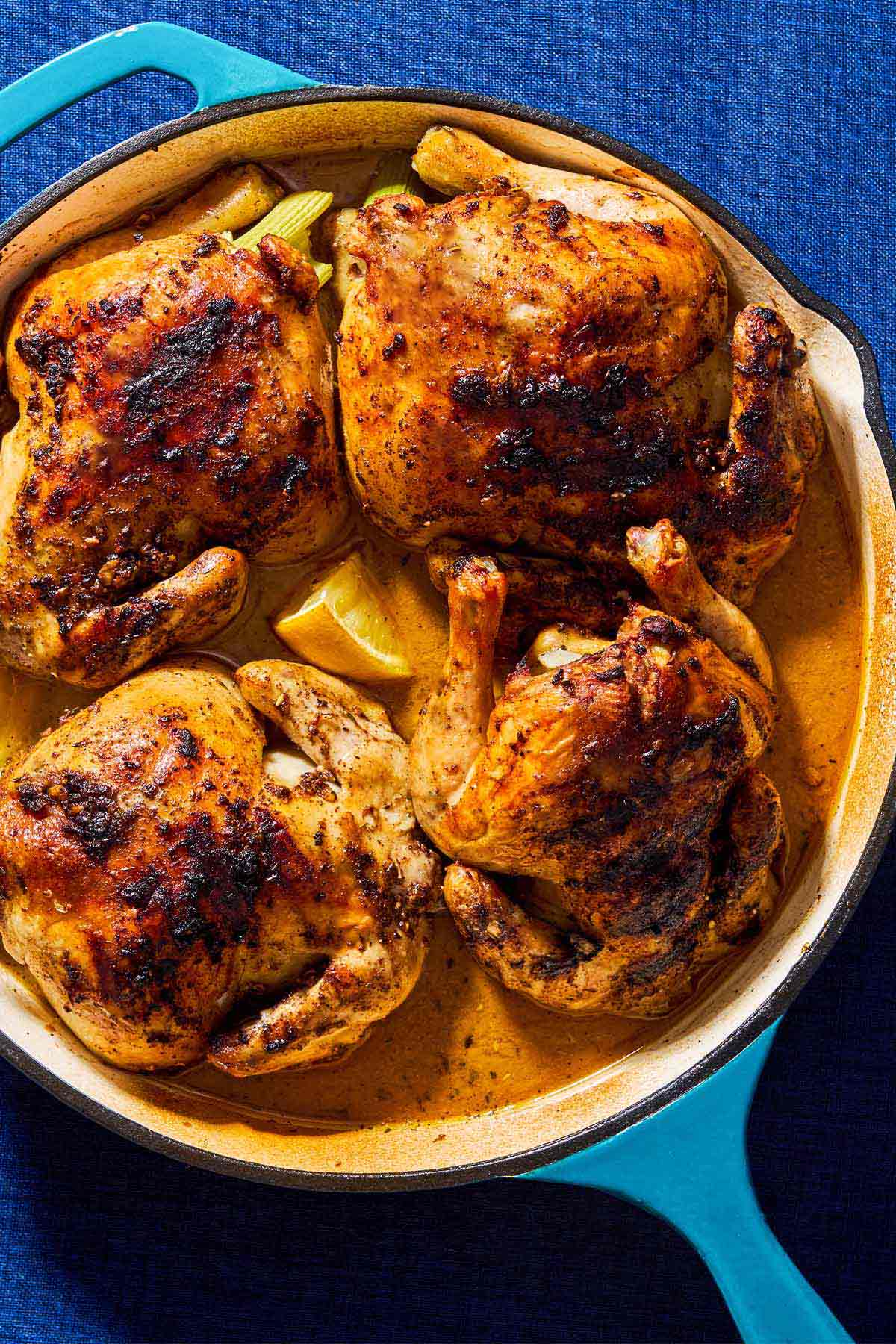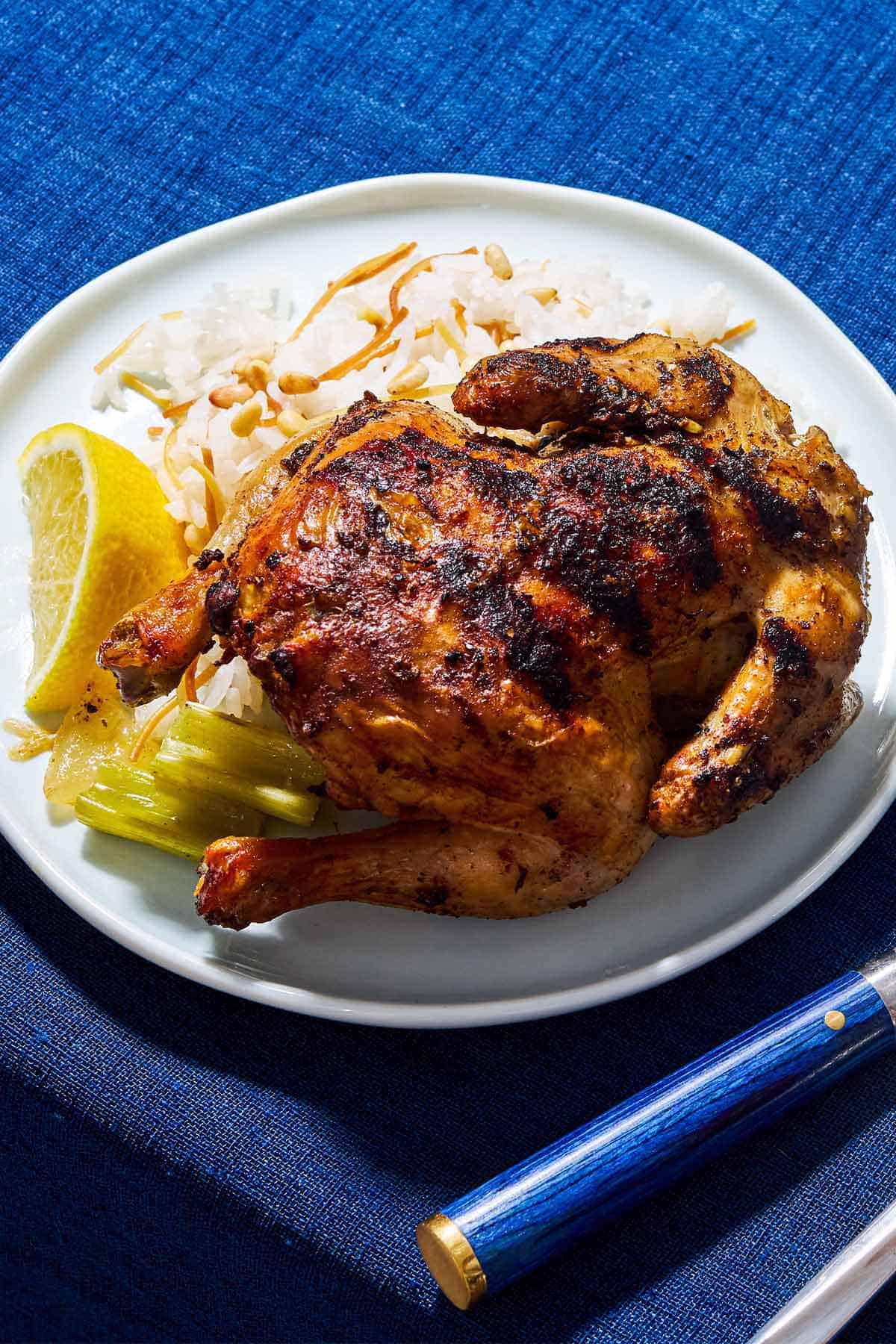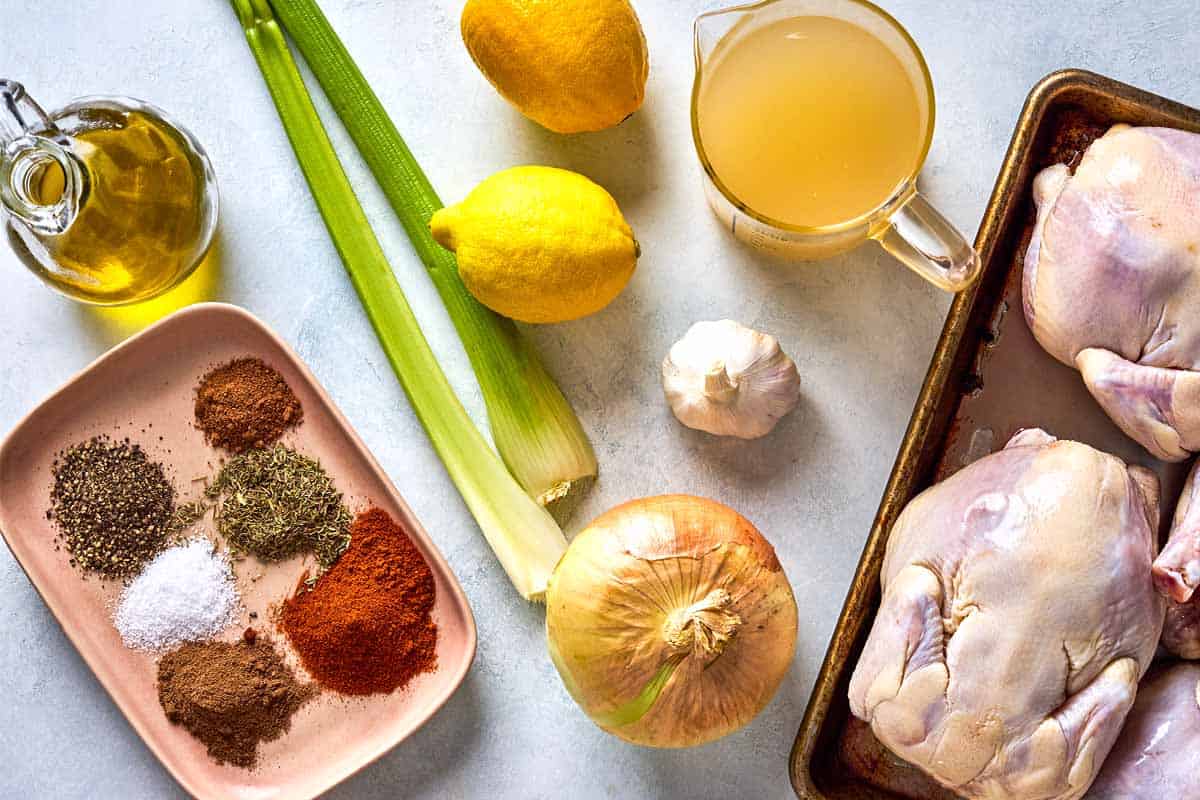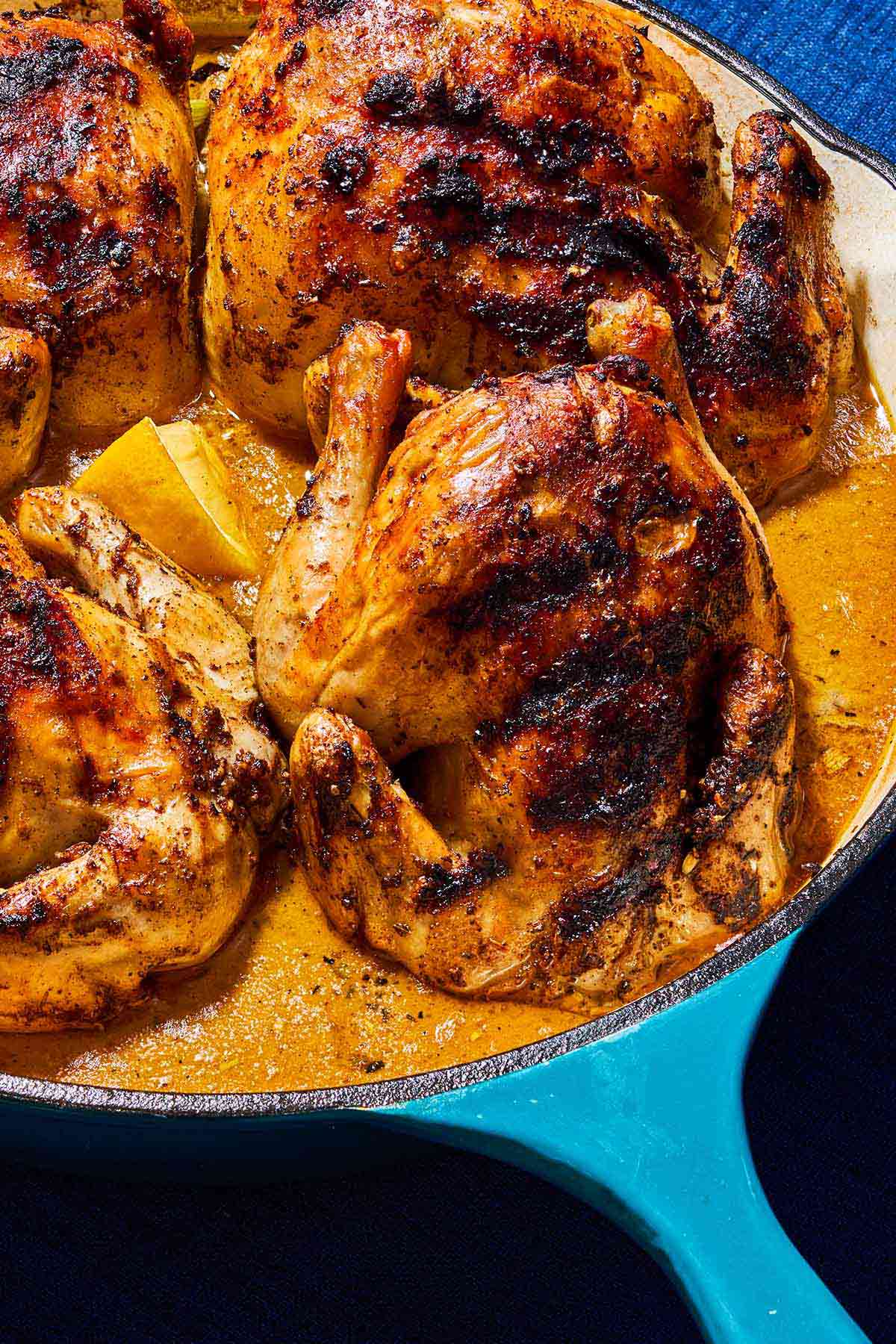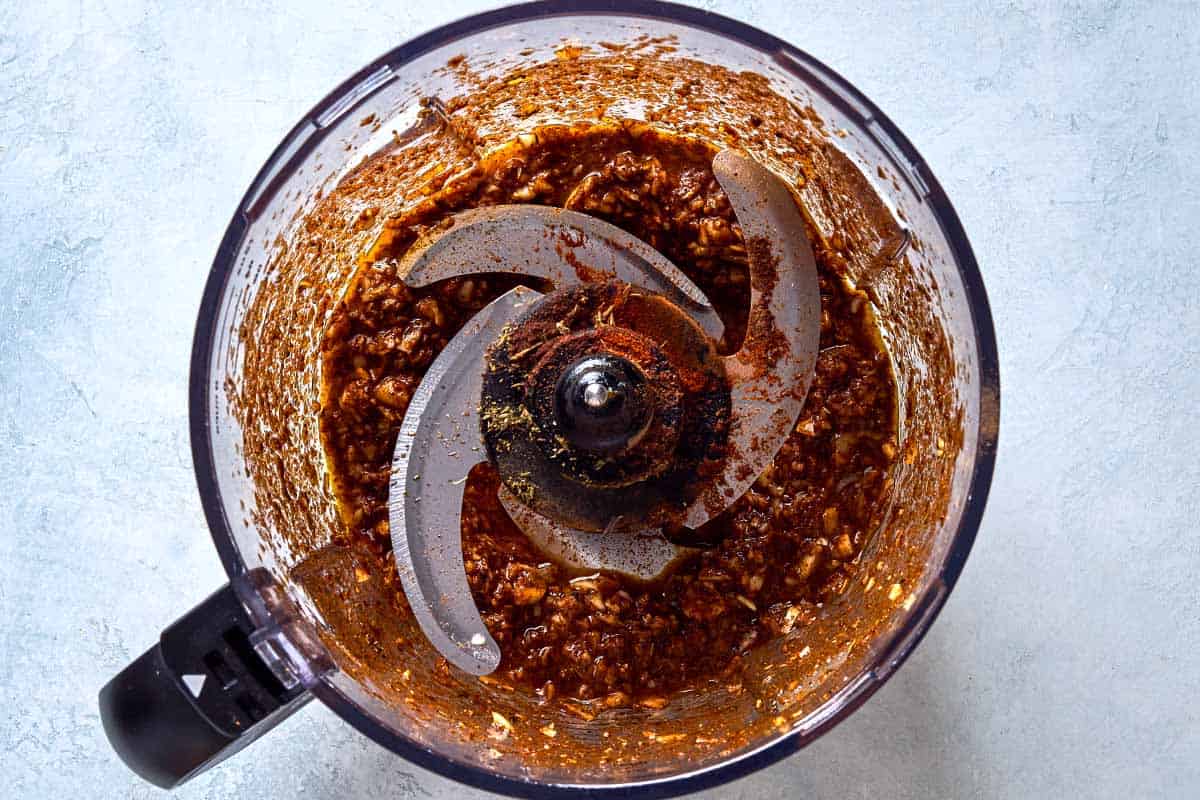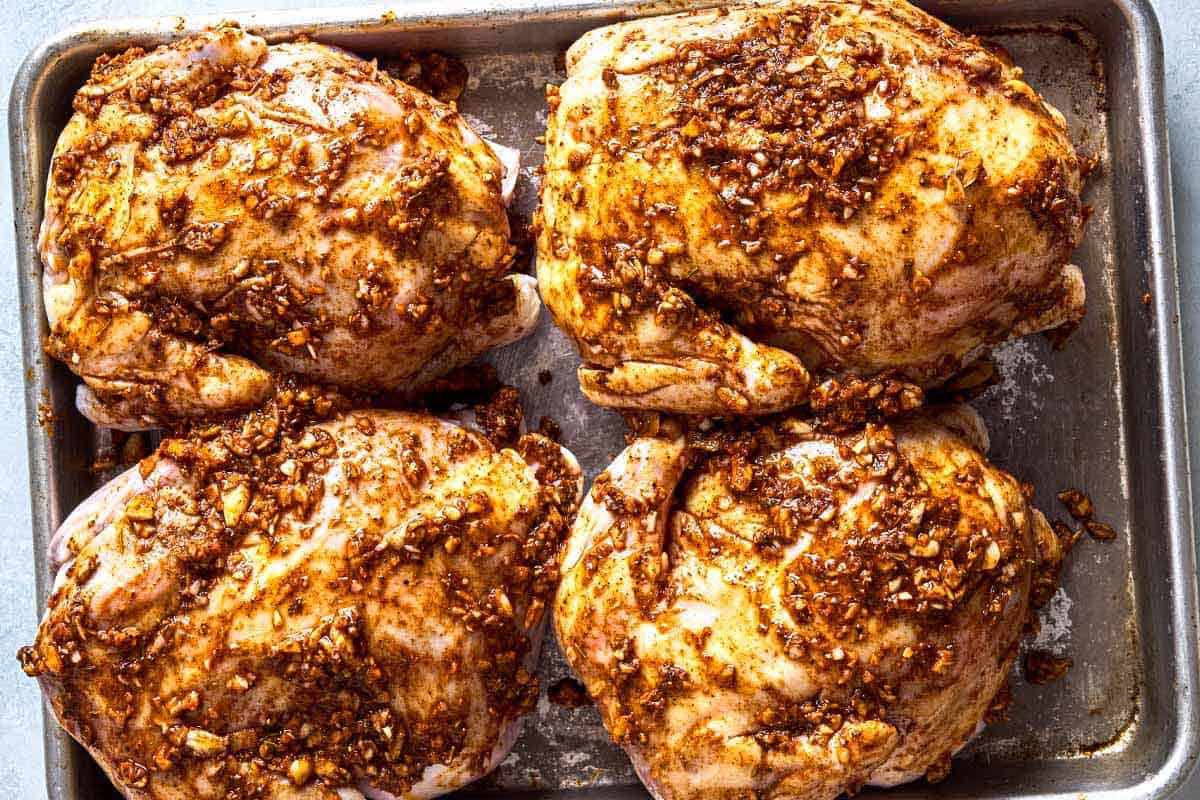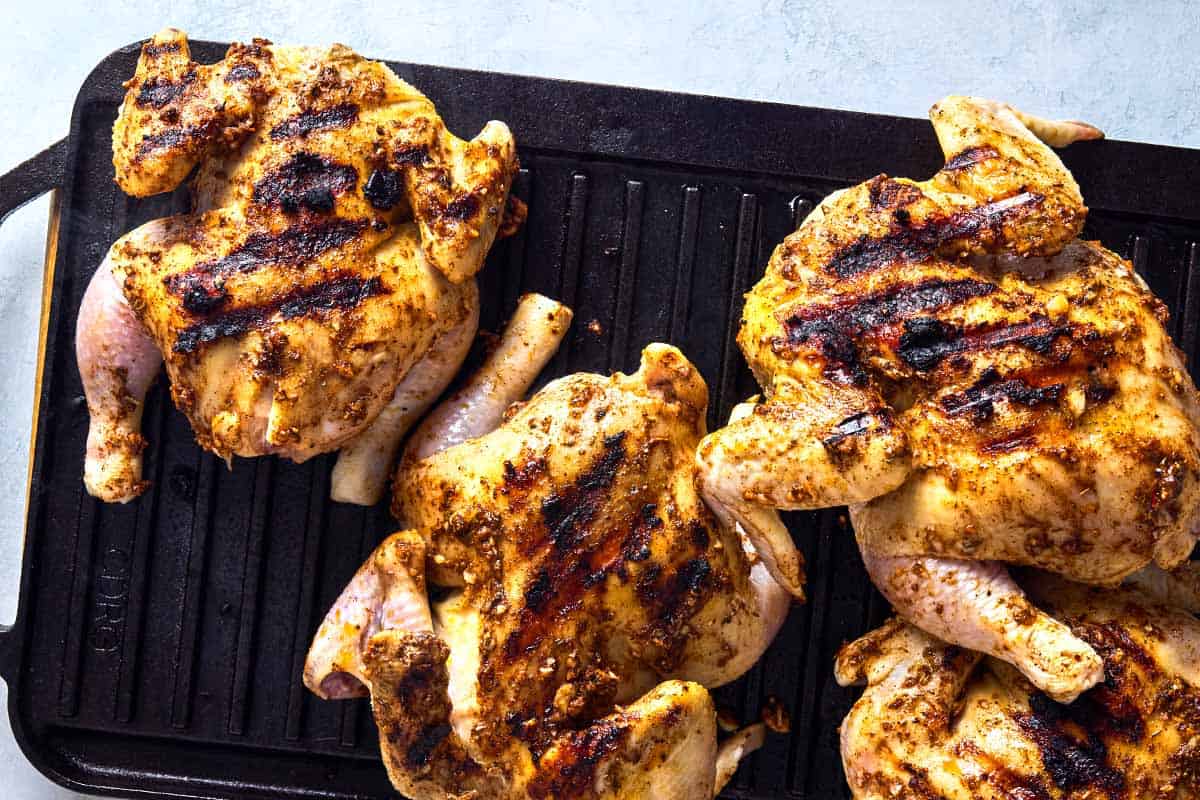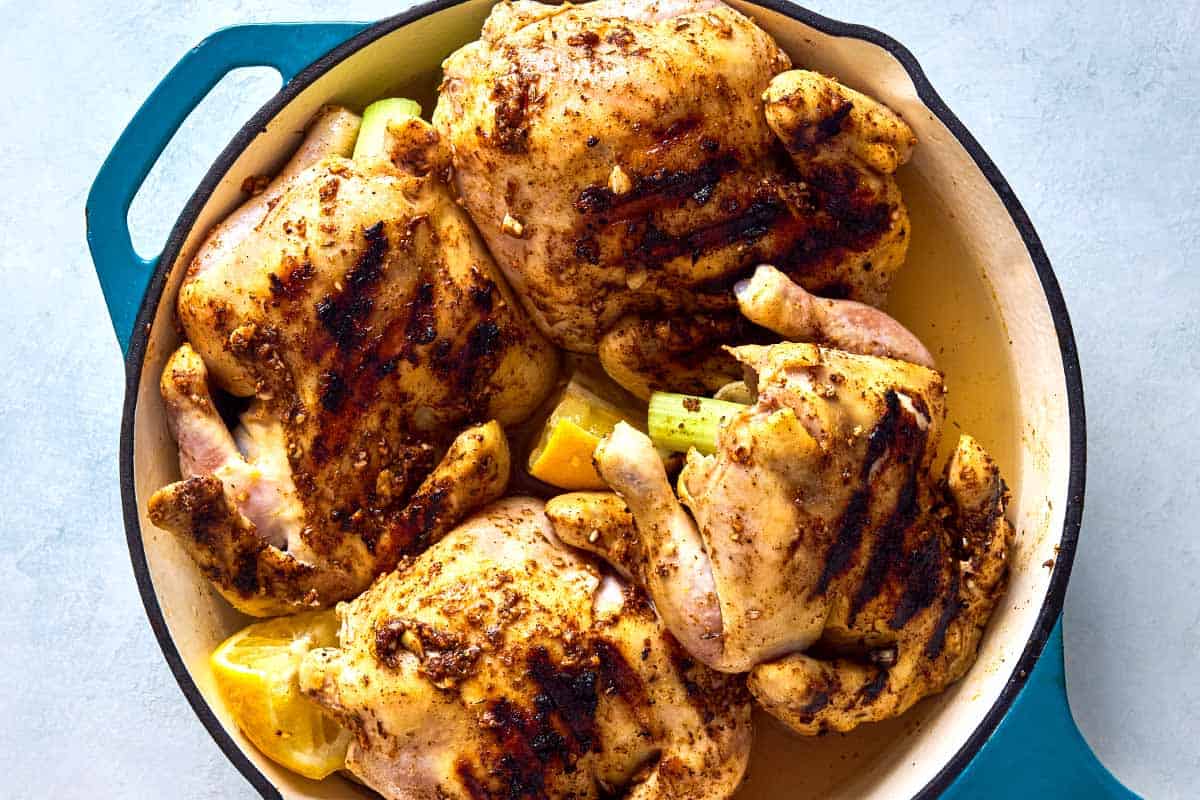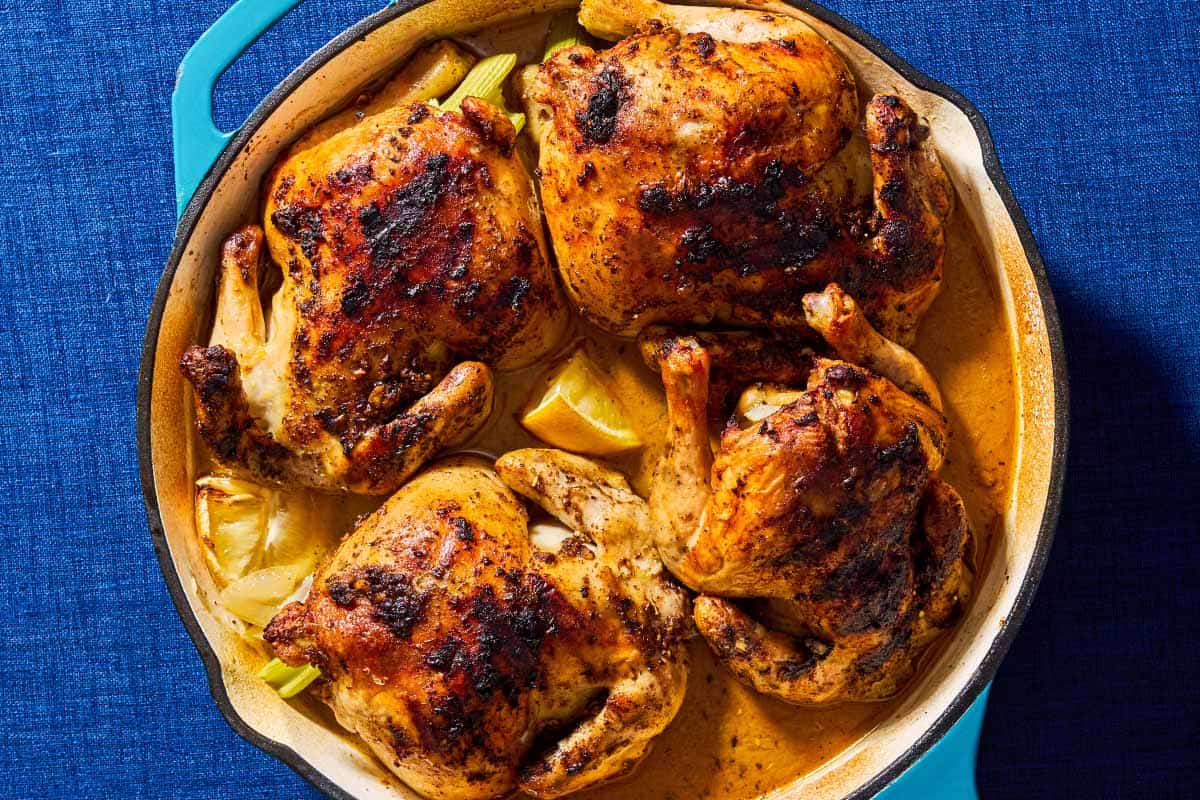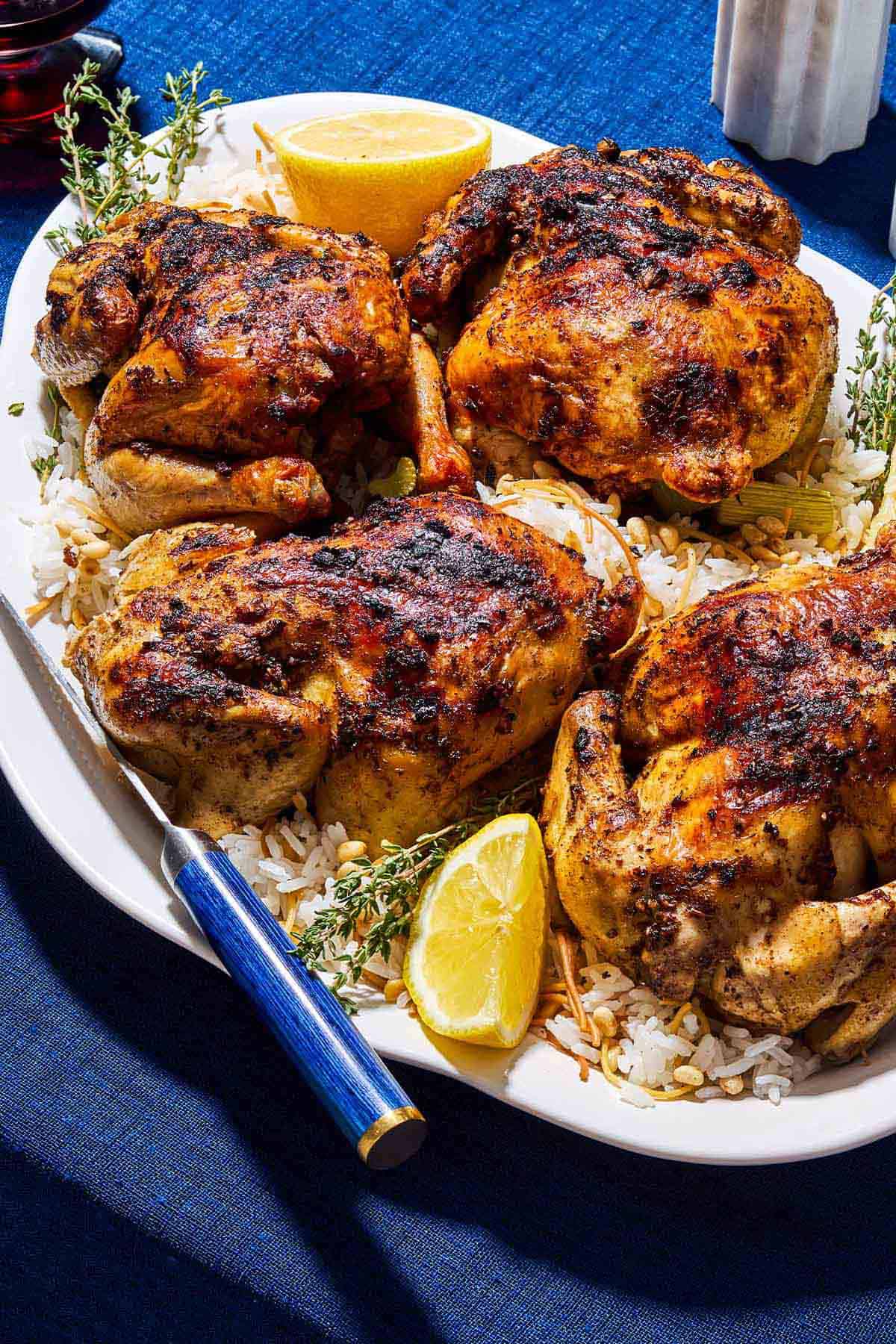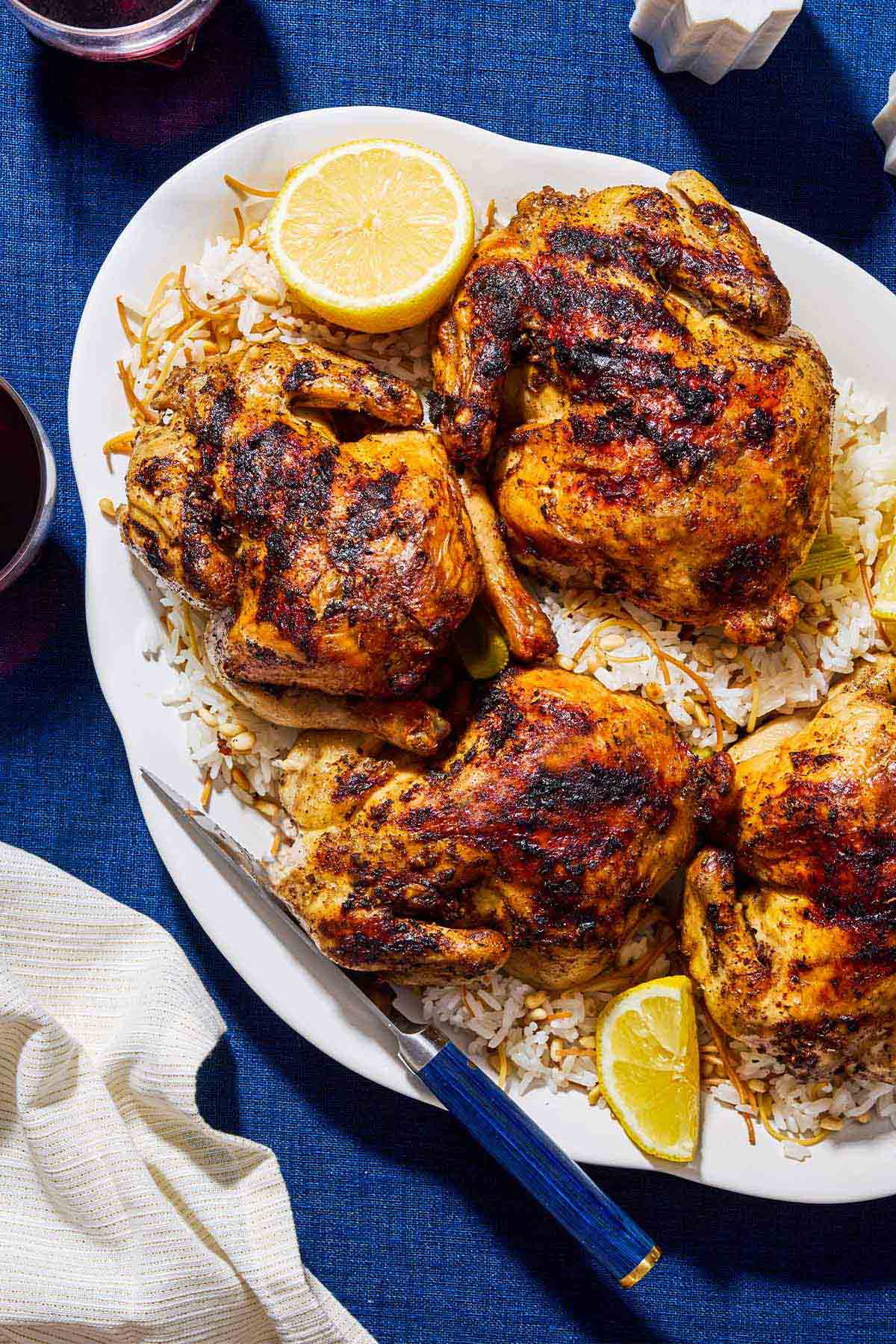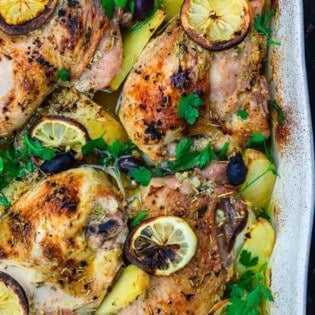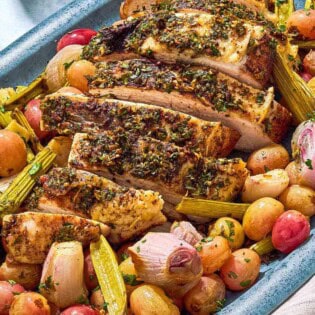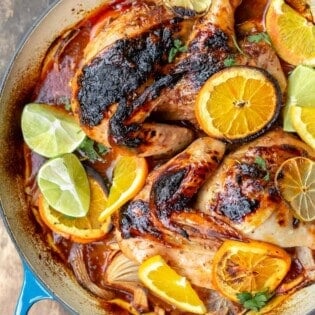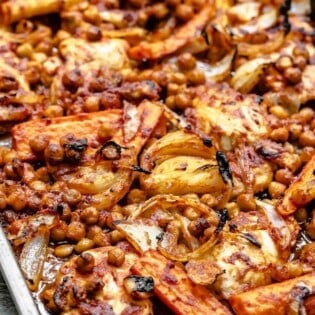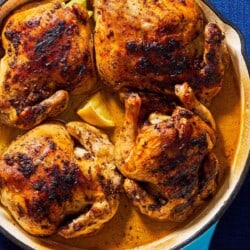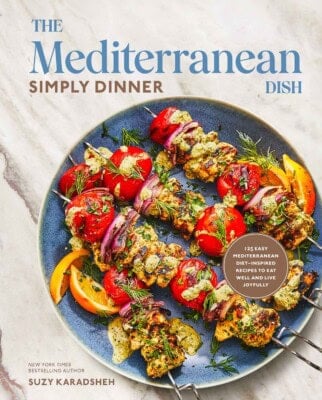Who wouldn’t love their own personal whole roasted chicken?! That’s the beauty of the lesser-known and under-appreciated Cornish hen. Don’t let the fancy name fool you, this recipe is surprisingly easy. The spice marinade comes together in minutes, and roasting Cornish hens only takes about an hour. So, minimal effort for maximum flavor — that’s my kind of cooking! These beautiful birds are succulent and tender, with a simple but bold marinade made with lots of fresh garlic, a splash of bright citrus, and big flavor from warming allspice and nutmeg. The crispy skin adds a delightful textural contrast, making every bite a party in your mouth! This roasted Cornish game hen recipe is perfect for a romantic night in, a small gathering with friends, or a holiday centerpiece. Give each person their own, or split them in half to feed a crowd with lots of extras! Serve them with roasted vegetables for a complete and healthy meal. You can also whip up a quick couscous or an Easy Rice Pilaf to soak up all those delicious juices. It’s a simple yet elegant dish that’s guaranteed to become a new favorite in your roasting repertoire.
What is a Cornish Hen?
Once upon a time, the term Cornish hen (also called Rock hens or Cornish game hens) referred to a particular type of pure breed chicken harvested young while at a small size. Now though, that breed restriction on the name no longer exists so Cornish hens are, you guessed it, little chickens! The birds are essentially a miniature version (usually around one to two pounds) of regular whole chickens. The flavor difference between chicken and Cornish hen is almost negligible. Cornish hens have a slightly milder flavor, but they basically taste like the chicken you’re used to eating. So why seek them out at all?
Because of their small size, whole or halved Cornish hens are perfect for serving. That way each person gets a nice mix of white meat and dark. Because they are harvested younger, Cornish hens are more tender than larger chickens. Because of their surface area, Cornish hens readily absorb flavor from marinades, spice rubs, and seasonings.
What is in this Cornish Hen Recipe?
You may use some of these seasonings most often for holiday baking, but besides the Cornish hens themselves, everything in this recipe is easy to find at your regular grocery store. Here’s what you’ll need:
For the Spiced Garlic Marinade
Garlic is a major flavor player in this marinade. Peel but don’t bother to chop the cloves; the food processor will do the work for you. Feel free to cut the quantity to suit your tastes. Hot or sweet paprika gives a deep, warm flavor and beautiful orange color to the Cornish game hens. Ground allspice adds complex spice to the marinade mixture. It’s not as distinctive as cinnamon but will definitely keep people wondering what that warm, wonderful spice is. Dried thyme leaves bring some woodsy green flavor to the marinade and work beautifully with that of the Cornish hens. Ground black pepper adds pleasant warmth and a slight kick to the recipe. Ground Nutmeg the silent star in this spice mixture, giving it an extra layer of aroma without reading as sweet. Extra virgin olive oil carries the flavor of the spices and garlic and helps coat the Cornish hens. I use our Private Reserve Greek extra virgin olive oil Salt: a couple of pinches of salt brings harmony to the flavor of the marinade. Fresh lemon or lime juice acts as a tenderizer and adds a pop of brightness that amplifies the intensity of the other flavors in the marinade.
For the Roasted Cornish Hens
Cornish hens: You’ll need four Cornish hens for this recipe. They’re often sold frozen in packages of one or two. Try to get four of a similar size so they cook at the same speed. Vegetables: Celery sticks and a large onion, roughly chopped and stuffed inside the Cornish hens, help flavor the birds as they cook and ensure they don’t dry out. Lemon or lime: Fresh citrus adds lots of tartness to both the marinade and the Cornish hens. Don’t discard the citrus halves after squeezing the juice from them; I like to add them to the cavities along with the vegetables. Chicken broth provides flavor and moisture for roasted Cornish hens. I recommend basting the hens with the broth to help keep them juicy. Use homemade chicken broth or store-bought low-sodium broth.
Ingredient Spotlight
Though the name allspice makes it sound like an all-purpose spice blend, allspice is actually one spice that can do it all. It’s made from the ground dried berries of a perennial plant native to the Caribbean and Central America, but now it’s widely beloved all over the world. It has a peppery flavor with notes of vanilla, clove, and cinnamon, which makes it right at home in dessert recipes. But it also makes it a wonderful mystery ingredient to give savory dishes a special something. I love how it works with sweet nutmeg to balance big, bold garlic flavor in roasted cornish hens, and with paprika in Sheet Pan Chicken with Vegetables. It’s also incredible in sweet and savory Braised Chicken Thighs with Mushrooms and Dried Figs.
TRY IT: Find my favorite allspice at our shop. BEST SUBSTITUTE: Ground cinnamon or cardamom.
How to Cook Cornish Hens
With the help of a food processor (or a mini chopper or blender) it takes only a moment to make the garlicky spiced marinade for roasted Cornish hens. Here’s the recipe method step by step:
Make the Marinade
Get ready. Place a rack in the middle of the oven and preheat to 425°F. Make the Spiced Garlic Marinade. In a food processor combine 15 to 20 peeled cloves of garlic, 2 1/2 teaspoons paprika, 1 1/2 teaspoon allspice, 1 1/2 teaspoon thyme, 1 teaspoon black pepper, 1/2 teaspoon nutmeg, 2 tablespoon extra virgin olive oil, and one to two good pinches of salt. Juice the lemon or lime into the processor, catching any seeds, and set aside the peel to use in the stuffing. Pulse to combine and then process into a pulpy mixture. It doesn’t need to be completely smooth.
Prep the Cornish Hens
Add the marinade to the hens. Apply the marinade generously to the outside and in the cavity of 4 Cornish hens. Lift the skin of the breast and apply some of the marinade underneath. Grill or sear the hens. Heat a lightly-oiled cast iron grill pan or skillet over medium to medium-high. Add the hens, in batches if necessary, and grill or sear the hens on all sides until they have grill marks or a nice golden brown color, a few minutes per side. Set them aside momentarily to cool. Stuff the hens. Once the hens are cool enough to handle, stuff each one with a combination of 2 roughly chopped stalks of celery and 1 roughly chopped sweet onion. Now squeeze the juice of the remaining lime or lemon onto the hens. Add a spent lemon half, including those from making the marinade, into the cavity of each hen along with the onion and celery.
Roast the Cornish Hens
Add chicken broth. Place the hens in a large cast iron skillet or roasting pan. Gently pour in 2 cups of chicken broth from the side of the skillet, taking care not to wash the marinade off of the hens. Bake the hens. Bake, basting the hens every 15 minutes with the broth, until the hens are nicely browned and cooked through, about an hour to 1 hour and 15 minutes. Remove from the oven and cover loosely with foil for 15 minutes to rest before serving.
Ways to mix it up
Add more vegetables: Make Roasted Cornish Hens into a full supper by roasting them on top of a bed of large diced carrots, whole baby potatoes, cabbage wedges, Brussels sprouts, mini peppers, or a vegetable medley. Use chicken instead: You can use this same method to make a whole chicken instead of four Cornish hens. Use a fryer chicken that’s five pounds or smaller. Larger than that and you might need to increase the cook time! Spatchcock the hens: To make a spatchcocked version of these Cornish game hens, spread the stuffing mixture onto an oiled sheet pan and then use it as a bed to roast either halved or whole spatchcocked hens. Follow this method to remove the backbones and spatchcock the Cornish hens. Grill Cornish hens: instead of using a grill pan and then an oven, you can make these Cornish Hens from start to finish on your grill. First, grill the hens over direct heat to get those nice grill marks. Then, switch the grill set up for indirect heat and transfer the hens to an aluminum grill pan or a cast iron skillet and add the chicken stock as instructed. Grill the hens over medium, indirect heat until done.
Tips for the Best Roasted Cornish Hens
Be generous with the marinade. Be sure to get the marinade particularly under the skin for best flavor. And don’t skimp on the garlic! 15 to 20 cloves of garlic might seem like a lot, but it infuses the Cornish game hens with so much flavor! Sear before roasting. Don’t skip the step of browning the hens on a grill pan or in a skillet before you roast them. It helps give Cornish hens great color, as well as perfectly crispy skin. Don’t overcook them. Like chicken, Cornish game hens are ready when their internal temperature is 165°F, but remember that they will continue to cook as they rest after you take them out of the oven, so take that into consideration and pull them out a little bit earlier. Allow Cornish hens to rest after roasting. Again, just like chicken, roasted Cornish hens should rest for at least a few minutes before serving for best flavor and to allow the juices to redistribute.
How to Get Ahead and Storage Suggestions
Cut down the work and amp up the flavor of this Cornish hen recipe by marinating the Cornish Hens ahead of time. You can prepare the marinade and add it to the hens a day before you plan to roast them. Store them in the fridge in an airtight container. You can also chop the vegetables ahead of time. The following day, stuff the hens as you wait for the oven to heat. Once cooled, leftover cooked Cornish hens can be stored in an airtight container in the fridge for up to 3 days or in the freezer for up to two months.
How Can You Tell When Cornish Hens are Done?
A Cornish hen is done cooking when its internal temperature reaches 165°F taken with an instant-read thermometer in the thickest section of the thigh, near the bone, but not touching it. If you cut into the thigh joint the juices should be clear.
What to Serve with Roasted Cornish Hens
Whole roasted Cornish game hens make a beautiful plate for a holiday meal or for when you have guests over. If you’re feeding a larger crowd and have an abundance of sides, halve the Cornish hens. I like to serve them with sides I can cook in the oven while the hens roast including Italian roasted veggies, cinnamon roasted sweet potatoes, simple roasted carrots or Brussels sprouts. The flavors in the spiced garlic marinade would also be particularly tasty with Mushroom Risotto, or for something a little lighter, roast tomato and eggplant in the oven for Borani Kadoo (Roasted Zucchini and Tomatoes with Garlicky Yogurt) while the hens cook. For a complementary salad, try Roasted Beet Salad with Crispy Kale and Almonds or this a Healthy Potato Salad with Tomatoes, Cucumber, Kale and Pesto. Browse all Mediterranean recipes. Visit Our Shop. *This post first appeared on The Mediterranean Dish in December of 2015 and has recently been updated with new information and media for readers’ benefit. Enjoy!
Greek Chicken and Potatoes
Roast Turkey Breast with Garlic and Herbs
Citrus Rosemary Chicken
Sheet-Pan Smoked Paprika Chicken with Chickpeas and Carrots
125 Easy Mediterranean Diet-Inspired Recipes to Eat Well and Live Joyfully from New York Times Bestselling Author Suzy Karadsheh


